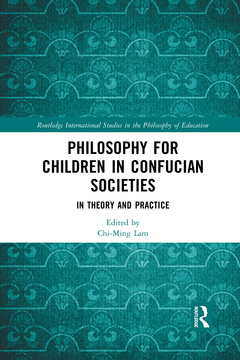Philosophy for Children in Confucian Societies In Theory and Practice Routledge International Studies in the Philosophy of Education Series
Coordonnateur : Lam Chi-Ming

This book contributes to the theory and practice of Philosophy for Children (P4C), with a special emphasis on theoretical and practical issues confronting researchers and practitioners working in contexts that are strongly influenced by Confucian values and norms. It includes writings by prominent P4C scholars from four Confucian societies, viz., Mainland China, Hong Kong, Taiwan, and Japan. These writings showcase the diversity of the P4C model, providing a platform for researchers and practitioners to tell their stories in their own Confucian cultural contexts.
The research stories in the first part of the book are concerned with assessing the impact of traditional Confucian norms, promoting critical thinking, reconstructing the notion of community of inquiry, creating moral winds, integrating philosophy into the school curriculum, and localizing teaching methods and materials. Four issues are discussed in the second part of the book: the tension between Confucianism and powerful thinking; cultural challenges for practitioners; the transformation of harmony; and the conception of family. Taken as a whole, the book provides fresh insights into whether and how P4C?s Westerninfluenced theories and practices are compromised when they are applied in non-Western, or rather Confucian, contexts.
A must-read for anyone interested in the theory and practice of P4C and Confucianism in general.
List of Contributors Chapter 1. Introduction: The Significance of Confucianism in the World (Chi-Ming Lam) Part I Philosophy for Children in the Chinese Triangle of Mainland China, Hong Kong, and Taiwan Chapter 2. From Confucian Dialogues to Socratic Dialogues: Some Lessons Learned From Applying P4C in an English as a Foreign Language Classroom (Shiauping Tian) Chapter 3. Is It Possible to Teach Critical Thinking to Hong Kong Students Through Philosophy for Children? (Chi-Ming Lam) Chapter 4. Confucian Dialogue and the Reconstruction of the Community of Inquiry in Philosophy for Children (Zhenyu Gao) Chapter 5. Creating Moral Winds and Nurturing Moral Growth in a P4C Classroom Community in Taiwan (Jessica Ching-Sze Wang) Chapter 6. Fostering Thinking and English Proficiency Through Philosophy for Children in Integrated Humanities Classes in Hong Kong (Chi-Ming Lam) Chapter 7. “No One Uses Chopsticks to Drink Soup!”: Philosophy for Children in Taiwan (Peter Mau-Hsiu Yang and Jane Parish Yang) Part II Philosophy for Children in Japanese Societies Chapter 8. Philosophy for Children in Confucian Societies: The Case of Japan (Satoshi Higuchi and Laurance J. Splitter) Chapter 9. The Development of P4C in Japanese Society and the Challenges for Practitioners (Tetsuya Kono and Shogo Shimizu) Chapter 10. Transforming Harmony in Moral Dialogue in the Classroom (Mitsuyo Toyoda) Chapter 11. INOCHI, or On the Ties of “Family”: Practical Possibilities of Japanese Philosophizing With Children (Takara Dobashi) Chapter 12. Conclusions: Philosophy for Children in Confucian Societies (Chi-Ming Lam) Index
Chi-Ming Lam is Associate Professor and Associate Head of the Department of International Education at the Education University of Hong Kong. His research interests include the philosophy of Karl Popper, critical thinking, Confucianism, and philosophy for children. His books include Childhood, Philosophy and Open Society: Implications for Education in Confucian Heritage Cultures (2013) and Sociological and Philosophical Perspectives on Education in the Asia-Pacific Region (co-edited with Jae Park, 2016).
Date de parution : 06-2021
15.6x23.4 cm
Date de parution : 11-2019
15.6x23.4 cm
Thèmes de Philosophy for Children in Confucian Societies :
Mots-clés :
Urashima Taro; Yangtze River; moral dialogue; Foreign Language Classroom Anxiety Scale; Singapore; Good Life; Japan; Pursue Teacher Education; community of Inquiry; Daiichi Nuclear Power Plant Accident; Taiwan; Knowledge Strand; Hong Kong; Harmonious Society; Mainland China; Junior High School English Teacher; Chinese Triangle; P4C Class; Ethics in Education; P4C Classroom; Ethics and Children; Vocational High School; P4C; Fukushima Daiichi Nuclear Power Plant; Philosophy of education; Overseas Chinese Family Businesses; asian education policy; Instant Performance; confucian heritage; CHC; Philosophy for Children model; Strongly Disagreed; Confucian values; CHC Learner; Confucian cultural contexts; Jun Zi; Western-influenced theories; CHC Student; English Language Proficiency; Novissima Sinica; Picture Storybooks; Friend To Friend; Intellectual Safety



